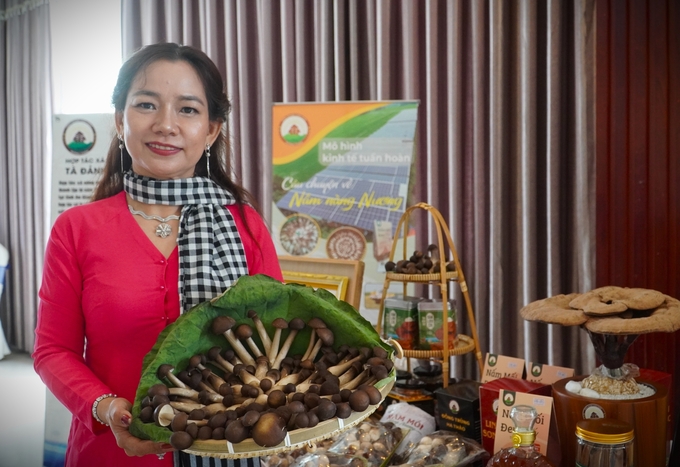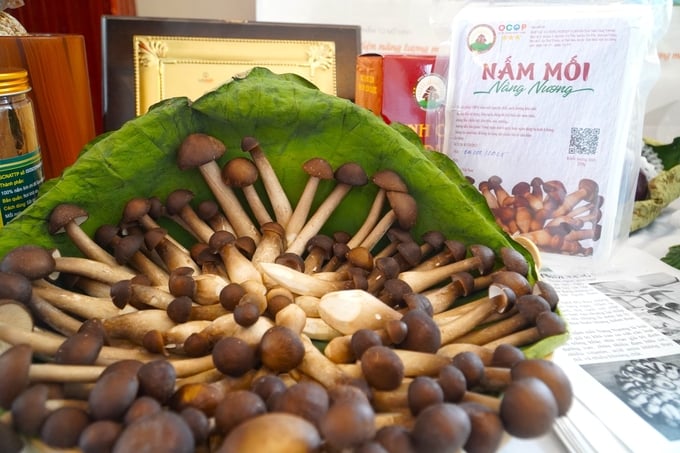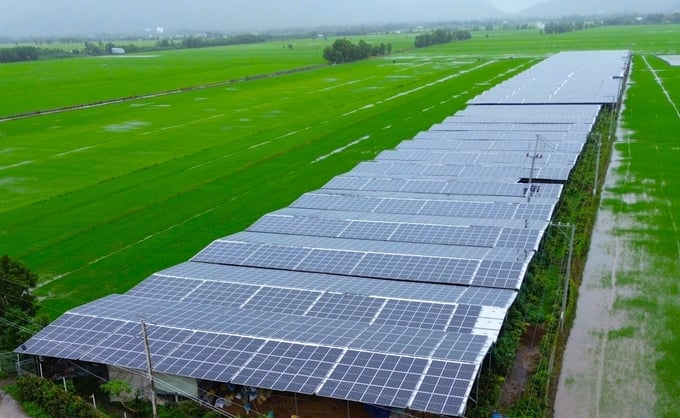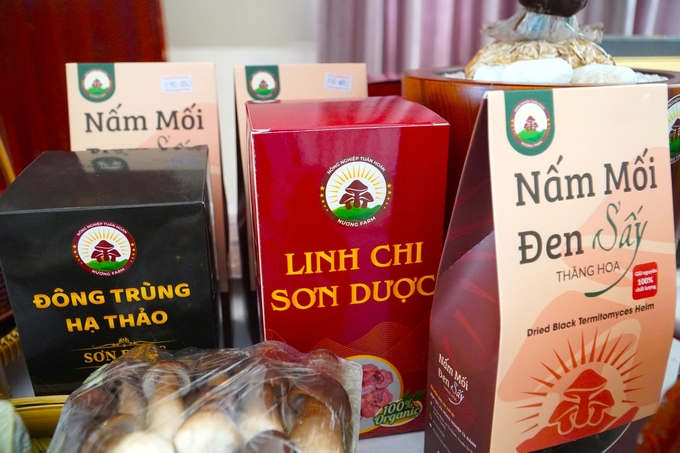May 30, 2025 | 10:36 GMT +7
May 30, 2025 | 10:36 GMT +7
Hotline: 0913.378.918
May 30, 2025 | 10:36 GMT +7
Hotline: 0913.378.918

Ms. Chau Thi Nuong is a pioneer in shifting to circular medicinal mushroom cultivation, integrating agricultural solar power to increase income and create jobs for dozens of local workers. Photo: Kim Anh.
Taking advantage of agricultural by-products, Ms. Chau Thi Nuong, a farmer from Ta Danh Commune, Tri Ton District, An Giang Province, has pioneered a closed-loop medicinal mushroom cultivation model. By integrating agricultural solar energy, her farm not only achieves high economic efficiency but also aligns with the global trend of sustainable and eco-friendly agriculture.
Covering an area of approximately four hectares, the farm has around 2.2 hectares equipped with solar panels. This innovative approach serves multiple purposes: it conserves energy for farm operations, stabilizes temperatures, and creates optimal growing conditions for mushrooms. The shaded areas under the solar panels maintain a cooler temperature and the right humidity level, eliminating the need for additional cooling systems. As a result, the quality of the mushrooms is significantly improved while reducing operational costs.
Moreover, the installation of solar panels brings an added economic advantage. In addition to lowering production expenses, the farm also generates additional income by selling excess electricity. According to Nuong, after five years of investment, her family has successfully recovered their initial capital and is now enjoying stable and high long-term profits.

Black termite mushrooms are highly favored for their natural sweetness, crisp texture, delightful aroma, and rich nutritional value. Photo: Kim Anh.
In addition, Ms. Nuong utilizes rice straw and rice bran as substrates for cultivating reishi mushrooms and cordyceps. After harvesting, the spent mushroom substrate is reused to grow other types of mushrooms or to raise earthworms, which in turn are used to produce organic fertilizer for crops. Notably, all agricultural products on her farm are cultivated without the use of chemical fertilizers or pesticides. This closed-loop production system maximizes the use of agricultural by-products, minimizes environmental waste, and generates high added value.
Nuong’s integrated solar power and agricultural production model was developed after years of overcoming challenges in the transition process. Originally, her family’s land was dedicated to rice farming, but in 2020, she recognized the potential of medicinal mushrooms, which are known for their detoxifying properties and high nutritional value. This realization led her to embark on a journey of research and learning to master the cultivation of medicinal mushrooms.

An overview of the agricultural solar farm operated by Ta Danh Cooperative in Tri Ton District, An Giang Province. Photo: Kim Anh.
At present, the farm specializes in cultivating high-value medicinal mushrooms, which are highly regarded for their nutritional and health benefits. Among its key products is the black termite mushroom, known for its rich content of organic protein, essential vitamins, amino acids, and minerals. This mushroom serves as a natural alternative to monosodium glutamate (MSG) in cooking, offering both flavor enhancement and health benefits.
Additionally, the farm grows reishi mushrooms, which are widely used to support overall health and boost the immune system, as well as cordyceps, a medicinal fungus highly valued for its exceptional nutritional properties and ability to strengthen the body’s resistance to illness. Another notable variety cultivated on the farm is the abalone mushroom.
The farm is able to supply over one ton of fresh mushrooms to the market each month. Its distribution network is broad, reaching wholesale markets, supermarkets, and a growing number of restaurant chains within An Giang Province and other nearby localities.
Among the various mushroom varieties cultivated, the black termite mushroom stands out as one of the most sought-after. This particular mushroom has been awarded a 3-star OCOP (One Commune, One Product) certification. Consumers favor it for its naturally sweet, crisp, and aromatic characteristics. To meet market demand, the farm produces between 50 to 60 kilograms of black termite mushrooms each day, translating to an annual yield of nearly 20 tons.
Beyond mushroom production, Ms. Chau Thi Nuong has also diversified her business by supplying mushroom spawn to customers who wish to cultivate mushrooms themselves. She actively shares her knowledge and provides guidance on mushroom-growing techniques and supports customers in marketing and selling their produce. After deducting operational and investment costs, Nuong’s family earns an average net profit of approximately 20% of the total mushroom production.

The medicinal mushroom products from Ta Danh Cooperative are now available in various wholesale markets, supermarkets, restaurants, and hotels both within and beyond An Giang Province. Photo: Kim Anh.
To expand production, Ms. Chau Thi Nuong established the Ta Danh Agricultural Cooperative in 2020 and branded her products under the name "Nuong Farm".
This model not only generates profits for the cooperative but also provides stable employment for 20 to 30 local workers. General laborers earn between 163 – 245 USD per month, while skilled workers receive salaries ranging from 327 – 367 USD per month.
During peak seasons, the workforce can increase to as many as 50 employees, most of whom are women, Khmer ethnic minorities, and young people. By creating stable job opportunities, the cooperative helps disadvantaged women secure reliable incomes and reduces the need for young workers to leave their hometowns in search of employment elsewhere.
To expand production and enhance product value, Ms. Chau Thi Nuong is investing in deep processing and post-harvest improvements while planning to develop a homestay tourism model. This initiative will allow visitors to experience mushroom farming firsthand, learn cultivation techniques, and enjoy dishes made from medicinal mushrooms.
With a strong focus on sustainable and eco-friendly agriculture, Ta Danh Cooperative received significant recognition in 2023. It was named one of the “Top 10 Outstanding Enterprises” in the Vietnam ESG Innovation Awards and won first place in the competition for initiatives that empower women economically in the rice value chain. These accolades serve as a testament to the cooperative’s modern circular farming model, which aligns with international agricultural trends.
Ms. Nuong firmly believes that with the right direction, Ta Danh Cooperative’s medicinal mushroom products will not only solidify their position in the domestic market but also have the potential to reach international consumers in the future.
Translated by Phuong Linh
/2025/05/25/4127-3-073637_820.jpg)
(VAN) Thanks to the promotion from an FAO-implemented project, vegetable production in greenhouses in Moc Chau has seen strong development, from 1.5 hectares in 2021 to nearly 50 hectares in 2024.

(VAN) FAO has recently supported USD 140,000 to implement the project 'Risk mitigation human-animal interface risks through disease control initiatives in pig farming.'

(VAN) The People's Committee of Tra Vinh province has approved an adjustment to the investment policy for the Green Hydrogen Plant project, increasing its area to approximately 52.76 hectares.
![Reducing emissions from rice fields: [2] Farmers’ commitment to the soil](https://t.ex-cdn.com/nongnghiepmoitruong.vn/608w/files/news/2025/05/05/dsc08881jpg-nongnghiep-140632.jpg)
(VAN) Clean rice cultivation model in Thuong Tan commune, Bac Tan Uyen district, is assisting local residents in achieving sustainable agriculture by substantially reducing costs, increasing productivity, and protecting the environment.

(VAN) At the conference to disseminate Resolution No. 68, AgriS introduced its digital agricultural ecosystem and reaffirmed its commitment to accompanying the Government in promoting private sector development and sustainable agriculture.

(VAN) 'Blue Ocean - Blue Foods' initiative is designed to restore marine ecosystems and establish sustainable livelihoods for local communities by cultivating a minimum of 1,000 hectares of cottonii seaweed in the first three years.
/2025/05/21/4642-3-112707_603.jpg)
(VAN) The V-SCOPE project has made direct contributions to three out of six pillars of the Comprehensive Strategic Partnership between Vietnam and Australia.